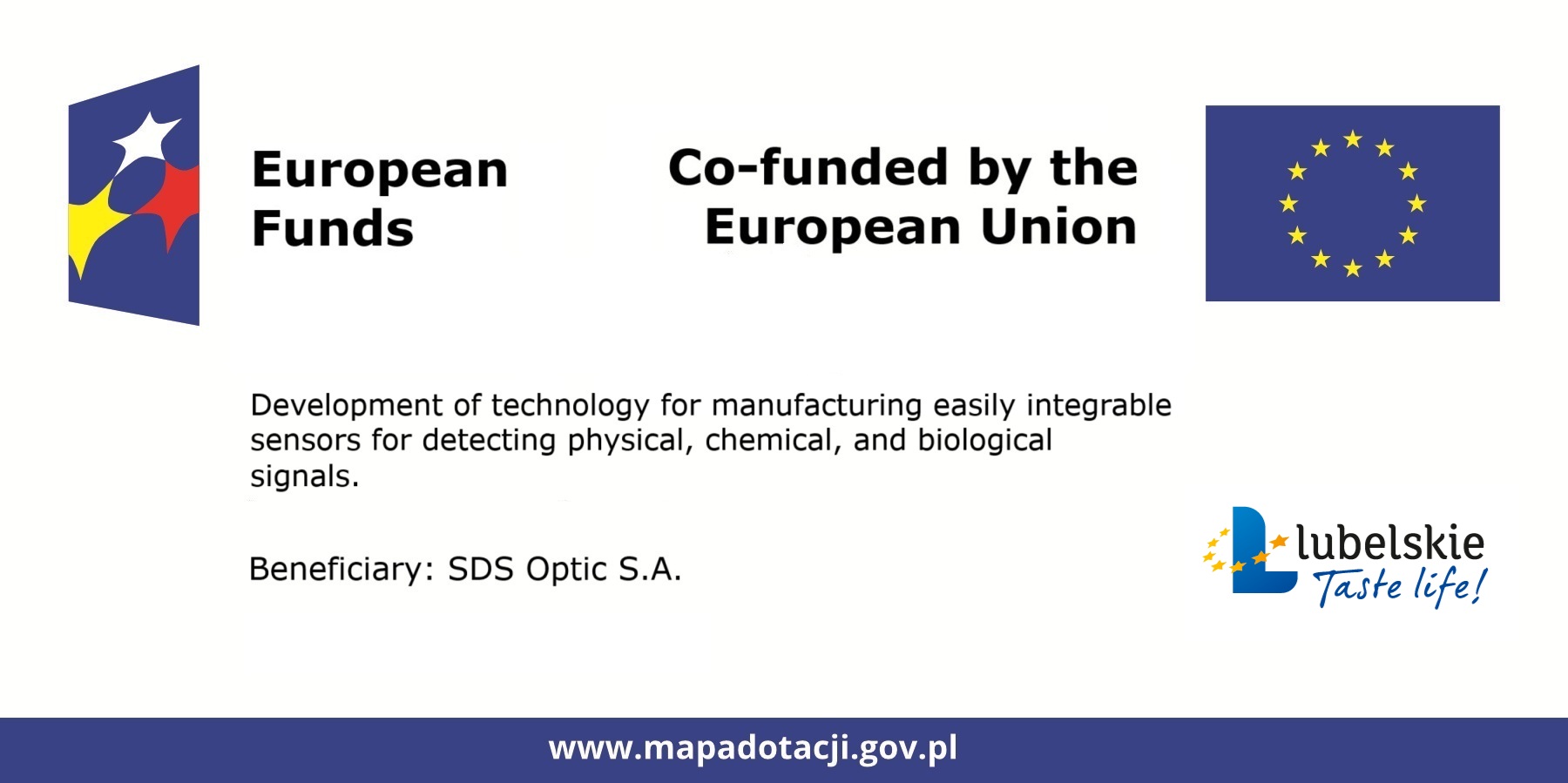LAWP 1.3 Research and innovation in the enterprise sector – easily integrable sensors for detection

SDS Optic S.A. has received funding from the European Union for the project: “Development of technology for manufacturing easily integrable sensors for detecting physical, chemical, and biological signals.”
Project objective: The goal of this research project is to develop advanced technology for the production of easily integrable sensors capable of simultaneously detecting signals from physical, chemical, and biological factors. The innovative aspect of the project lies in the creation of universal sensors that can be integrated with various platforms, such as optical fibers, lenses, or glass surfaces.
#EUFunds#EuropeanFundsProject value: PLN 3 478 484.32
Amount of contribution from European Funds: PLN 2 499 536.74
As part of the project, the following will be carried out:
- •Industrial research:
- Stage 1: Development of sensory layers for the detection of physical and chemical factors
- Stage 2: Verification of the sensitivity and selectivity of the sensory layers obtained in Task 1 under laboratory conditions
- Stage 3: Development of sensory layers for the detection of biological agents
- Stage 4: Verification of the sensitivity and selectivity of the sensory layers obtained in Task 3 under laboratory conditions
- Stage 5: Integration of layers for detecting physical and chemical agents with layers for detecting biological agents
- •Experimental development work:
- Stage 6: Production of a prototype of an integrated sensor for detecting physical, chemical, and biological signals, and its testing under real-world conditions
- •Pre-implementation work:
- Stage 7: Preparation of the documentation necessary to begin the implementation of the developed technology
The target groups have been defined as:
- 1.Entrepreneurs/Enterprises that commercially use sensors for building detectors will benefit from the innovation of the new product in the following way:
- •Increased Competitiveness: The ability to simultaneously detect dust levels, formaldehyde concentration, and the presence of mold in the air will enable companies to create more versatile and precise devices. As a result, businesses will be able to stand out in the market by offering advanced solutions that meet more demanding customer needs.
- •Increased Efficiency: Innovative sensors with the ability to integrate with various platforms (fiber optics, optical lenses, flat glass) will open up new application possibilities. Companies will be able to quickly and efficiently implement these sensors into different products, which will accelerate production processes and reduce operational costs.
- •Development of New Markets: Thanks to the versatility of the sensors, companies will have the opportunity to enter new markets such as healthcare, aviation, solar energy, and others. Modern sensors will serve as the foundation for creating innovative products that meet the needs of various sectors.
- 2.Research and development institutions will benefit from the project in the following way:
- •Development of Scientific Competencies: Modern sensor technologies will enable scientists to conduct more advanced research, contributing to the development of new theories and scientific discoveries. Simultaneous detection of various signals will allow comprehensive studies of air pollutants and their impact on health and the environment.
- •Cooperation with Industry: The integration of sensor layers with various platforms will open new opportunities for collaboration between research units and businesses. This can lead to joint R&D projects funded by both the public and private sectors.
- •Enhancing Reputation: By participating in innovative research projects, scientific institutions from the Lublin Voivodeship will be able to enhance their reputation both nationally and internationally. This can attract more students, researchers, and scientific grants.
- 3.Residents of the Lublin Voivodeship will benefit from the project in the following ways:
- •Improved Quality of Life: Modern sensors for monitoring air quality will enable more effective management and control of pollutants, directly translating into better health conditions for residents. Detection of formaldehyde and mold will support quicker identification and elimination of harmful factors.
- •Access to Innovative Products: As a result of the project, residents of the Lublin Voivodeship will have access to advanced technologies and products that improve their quality of life. These innovative solutions will be available locally, speeding up implementation and reducing costs.
- •Economic Development of the Region: The project will contribute to the growth of the region's economic potential by developing the optical sector and related industries. The creation of new jobs and increased employment will have a positive impact on the local economy. Residents will gain access to new employment opportunities and skills development.
- •Strengthening the Region's Position: Thanks to innovative research projects, the Lublin Voivodeship will strengthen its position in the market as a center for modern technologies and scientific research. This will attract additional investments and increase interest in the region from both investors and tourists.
Expected results: the development of a new class of multifunctional, accurate, and reliable sensors for environmental monitoring will enable the introduction of innovative devices to the market, revolutionizing air quality monitoring in cities. Increased efficiency and measurement accuracy will contribute to better air quality management and the protection of public health.

We Care About Your Privacy
SDS Optic S.A. uses cookies to improve and customize users experience on our website. By selecting 'Accept', you consent to the use of all cookies that gather and use information about your interactions with our site to provide personalized content and enhance your digital experience. Please read our Privacy Policy for more information.